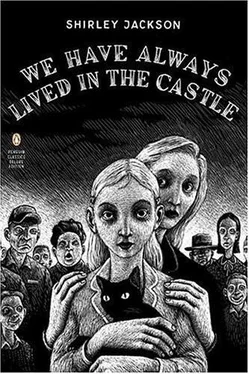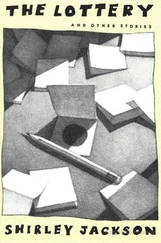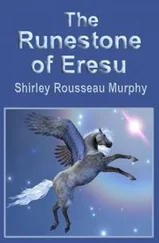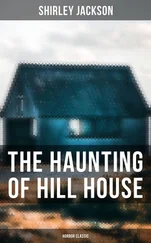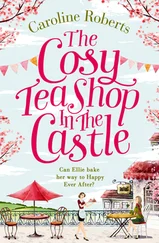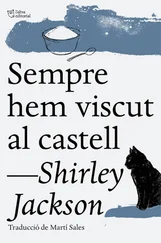Shirley Jackson - We Have Always Lived in the Castle
Здесь есть возможность читать онлайн «Shirley Jackson - We Have Always Lived in the Castle» весь текст электронной книги совершенно бесплатно (целиком полную версию без сокращений). В некоторых случаях можно слушать аудио, скачать через торрент в формате fb2 и присутствует краткое содержание. Город: New York, Год выпуска: 2006, ISBN: 2006, Издательство: Penguin Books, Жанр: Триллер, gothic_novel, на английском языке. Описание произведения, (предисловие) а так же отзывы посетителей доступны на портале библиотеки ЛибКат.
- Название:We Have Always Lived in the Castle
- Автор:
- Издательство:Penguin Books
- Жанр:
- Год:2006
- Город:New York
- ISBN:978-1-101-53065-8
- Рейтинг книги:3 / 5. Голосов: 1
-
Избранное:Добавить в избранное
- Отзывы:
-
Ваша оценка:
- 60
- 1
- 2
- 3
- 4
- 5
We Have Always Lived in the Castle: краткое содержание, описание и аннотация
Предлагаем к чтению аннотацию, описание, краткое содержание или предисловие (зависит от того, что написал сам автор книги «We Have Always Lived in the Castle»). Если вы не нашли необходимую информацию о книге — напишите в комментариях, мы постараемся отыскать её.
is a deliciously unsettling novel about a perverse, isolated, and possibly murderous family and the struggle that ensues when a cousin arrives at their estate.
We Have Always Lived in the Castle — читать онлайн бесплатно полную книгу (весь текст) целиком
Ниже представлен текст книги, разбитый по страницам. Система сохранения места последней прочитанной страницы, позволяет с удобством читать онлайн бесплатно книгу «We Have Always Lived in the Castle», без необходимости каждый раз заново искать на чём Вы остановились. Поставьте закладку, и сможете в любой момент перейти на страницу, на которой закончили чтение.
Интервал:
Закладка:
“People will gossip,” Mrs. Wright said reassuringly.
“I’ve been saying right along that I was a close friend of the Blackwoods and not the least bit ashamed of it, either. You want to come to people of your own kind, Constance. They don’t talk about us. ”
I wished they would be more amusing; I thought that now Constance was looking a little tired. If they would leave soon I would brush Constance’s hair until she fell asleep.
“Uncle Julian is coming,” I said to Constance. I could hear the soft sound of the wheel chair in the hall and I got up to open the door.
Helen Clarke said, “Do you suppose that people would really be afraid to visit here?” and Uncle Julian stopped in the doorway. He had put on his dandyish tie for company at tea, and washed his face until it was pink. “Afraid?” he said. “To visit here?” He bowed to Mrs. Wright from his chair and then to Helen Clarke. “Madam,” he said, and “Madam.” I knew that he could not remember either of their names, or whether he had ever seen them before.
“You look well, Julian,” Helen Clarke said.
“Afraid to visit here? I apologize for repeating your words, madam, but I am astonished. My niece, after all, was acquitted of murder. There could be no possible danger in visiting here now. ”
Mrs. Wright made a little convulsive gesture toward her cup of tea and then set her hands firmly in her lap.
“It could be said that there is danger everywhere,” Uncle Julian said. “Danger of poison, certainly. My niece can tell you of the most unlikely perils—garden plants more deadly than snakes and simple herbs that slash like knives through the lining of your belly, madam. My niece—”
“Such a lovely garden,” Mrs. Wright said earnestly to Constance. “I’m sure I don’t know how you do it.”
Helen Clarke said firmly, “Now, that’s all been forgotten long ago, Julian. No one ever thinks about it any more.”
“Regrettable,” Uncle Julian said. “A most fascinating case, one of the few genuine mysteries of our time. Of my time, particularly. My life work,” he told Mrs. Wright.
“Julian,” Helen Clarke said quickly; Mrs. Wright seemed mesmerized. “There is such a thing as good taste, Julian.”
“Taste, madam? Have you ever tasted arsenic? I assure you that there is one moment of utter incredulity before the mind can accept—”
A moment ago poor little Mrs. Wright would probably have bitten her tongue out before she mentioned the subject, but now she said, hardly breathing, “You mean you remember?”
“Remember.” Uncle Julian sighed, shaking his head happily. “Perhaps,” he said with eagerness, “perhaps you are not familiar with the story? Perhaps I might—”
“Julian,” Helen Clarke said, “Lucille does not want to hear it. You should be ashamed to ask her.”
I thought that Mrs. Wright very much did want to hear it, and I looked at Constance just as she glanced at me; we were both very sober, to suit the subject, but I knew she was as full of merriment as I; it was good to hear Uncle Julian, who was so lonely most of the time.
And poor, poor Mrs. Wright, tempted at last beyond endurance, was not able to hold it back any longer. She blushed deeply, and faltered, but Uncle Julian was a tempter and Mrs. Wright’s human discipline could not resist forever. “It happened right in this house,” she said like a prayer.
We were all silent, regarding her courteously, and she whispered, “I do beg your pardon.”
“Naturally, in this house,” Constance said. “In the dining room. We were having dinner.”
“A family gathering for the evening meal,” Uncle Julian said, caressing his words. “Never supposing it was to be our last.”
“Arsenic in the sugar,” Mrs. Wright said, carried away, hopelessly lost to all decorum.
“I used that sugar.” Uncle Julian shook his finger at her. “I used that sugar myself, on my blackberries. Luckily,” and he smiled blandly, “fate intervened. Some of us, that day, she led inexorably through the gates of death. Some of us, innocent and unsuspecting, took, unwillingly, that one last step to oblivion. Some of us took very little sugar.”
“I never touch berries,” Constance said; she looked directly at Mrs. Wright and said soberly, “I rarely take sugar on anything. Even now.”
“It counted strongly against her at the trial,” Uncle Julian said. “That she used no sugar, I mean. But my niece has never cared for berries. Even as a child it was her custom to refuse berries.”
“Please,” Helen Clarke said loudly, “it’s outrageous, it really is; I can’t bear to hear it talked about. Constance—Julian—what will Lucille think of you?”
“No, really,” Mrs. Wright said, lifting her hands.
“I won’t sit here and listen to another word,” Helen Clarke said. “Constance must start thinking about the future; this dwelling on the past is not wholesome; the poor darling has suffered enough.”
“Well, I miss them all, of course,” Constance said. “Things have been much different with all of them gone, but I’m sure I don’t think of myself as suffering.”
“In some ways,” Uncle Julian sailed on, “a piece of extraordinarily good fortune for me. I am a survivor of the most sensational poisoning case of the century. I have all the newspaper clippings. I knew the victims, the accused, intimately, as only a relative living in the very house could know them. I have exhaustive notes on all that happened. I have never been well since.”
“I said I didn’t want to talk about it,” Helen Clarke said.
Uncle Julian stopped. He looked at Helen Clarke, and then at Constance. “Didn’t it really happen?” he asked after a minute, fingers at his mouth.
“Of course it really happened.” Constance smiled at him.
“I have the newspaper clippings,” Uncle Julian said uncertainly. “I have my notes,” he told Helen Clarke, “I have written down everything.”
“It was a terrible thing.” Mrs. Wright was leaning forward earnestly and Uncle Julian turned to her.
“Dreadful,” he agreed. “Frightful, madam.” He maneuvered his wheel chair so his back was to Helen Clarke. “Would you like to view the dining room?” he asked. “The fatal board? I did not give evidence at the trial, you understand; my health was not equal, then or now, to the rude questions of strangers.” He gave a little flick of his head in Helen Clarke’s direction. “I wanted badly to take the witness stand. I flatter myself that I would not have appeared to disadvantage. But of course she was acquitted after all.”
“Certainly she was acquitted,” Helen Clarke said vehemently. She reached for her huge pocketbook and took it up onto her lap and felt in it for her gloves. “No one ever thinks about it any more.” She caught Mrs. Wright’s eye and prepared to rise.
“The dining room… ?” Mrs. Wright said timidly. “Just a glance?”
“Madam.” Uncle Julian contrived a bow from his wheel chair, and Mrs. Wright hurried to reach the door and open it for him. “Directly across the hall,” Uncle Julian said, and she followed. “I admire a decently curious woman, madam; I could see at once that you were devoured with a passion to view the scene of the tragedy; it happened in this very room, and we still have our dinner in here every night.”
We could hear him clearly; he was apparently moving around our dining-room table while Mrs. Wright watched him from the doorway. “You will perceive that our table is round. It is overlarge now for the pitiful remnant of our family, but we have been reluctant to disturb what is, after all, a monument of sorts; at one time, a picture of this room would have commanded a large price from any of the newspapers. We were a large family once, you recall, a large and happy family. We had small disagreements, of course, we were not all of us overblessed with patience; I might almost say that there were quarrels. Nothing serious; husband and wife, brother and sister, did not always see eye to eye.”
Читать дальшеИнтервал:
Закладка:
Похожие книги на «We Have Always Lived in the Castle»
Представляем Вашему вниманию похожие книги на «We Have Always Lived in the Castle» списком для выбора. Мы отобрали схожую по названию и смыслу литературу в надежде предоставить читателям больше вариантов отыскать новые, интересные, ещё непрочитанные произведения.
Обсуждение, отзывы о книге «We Have Always Lived in the Castle» и просто собственные мнения читателей. Оставьте ваши комментарии, напишите, что Вы думаете о произведении, его смысле или главных героях. Укажите что конкретно понравилось, а что нет, и почему Вы так считаете.
